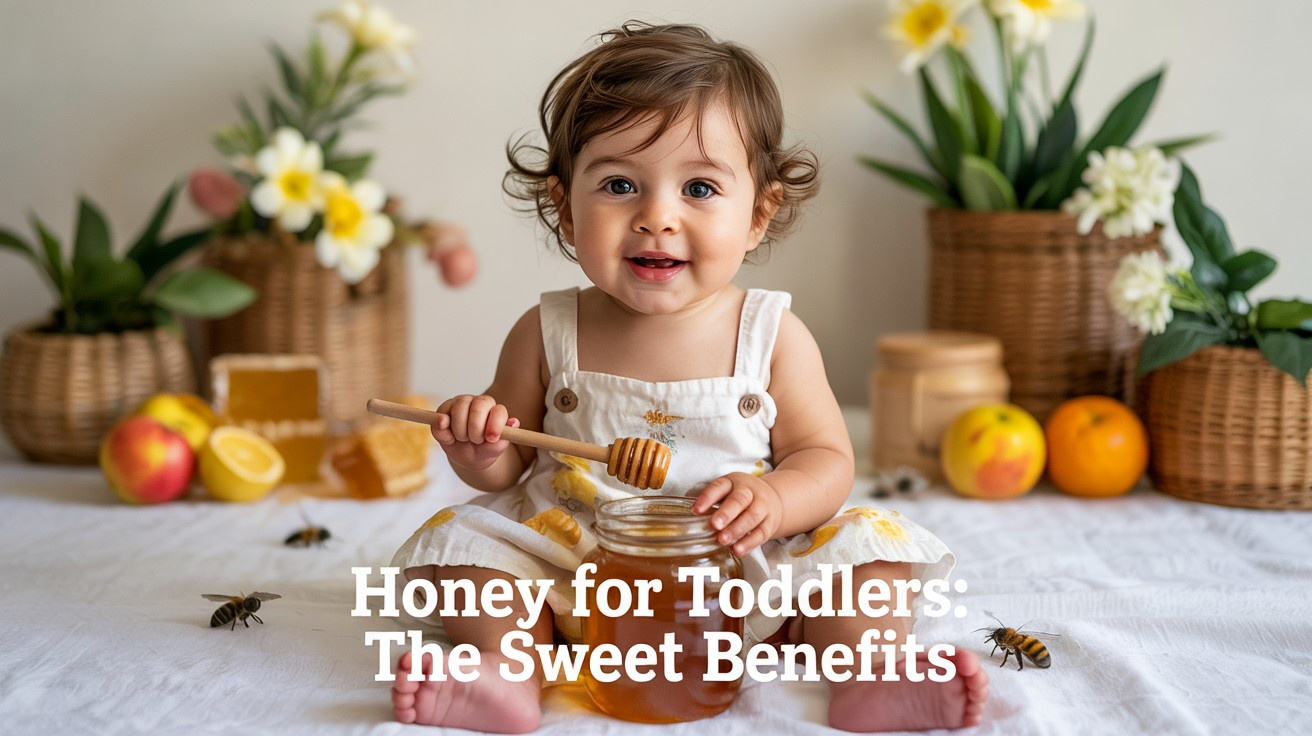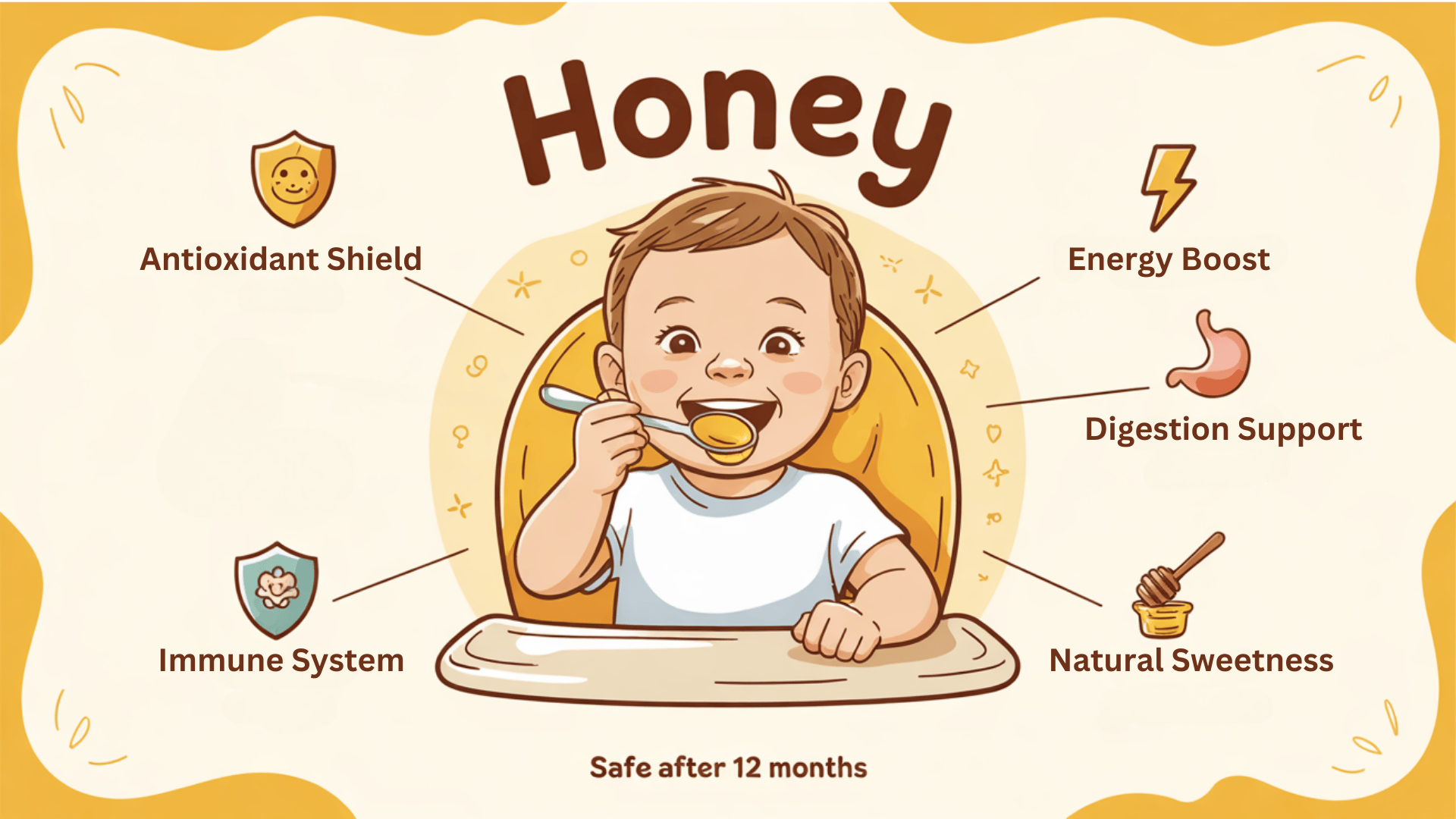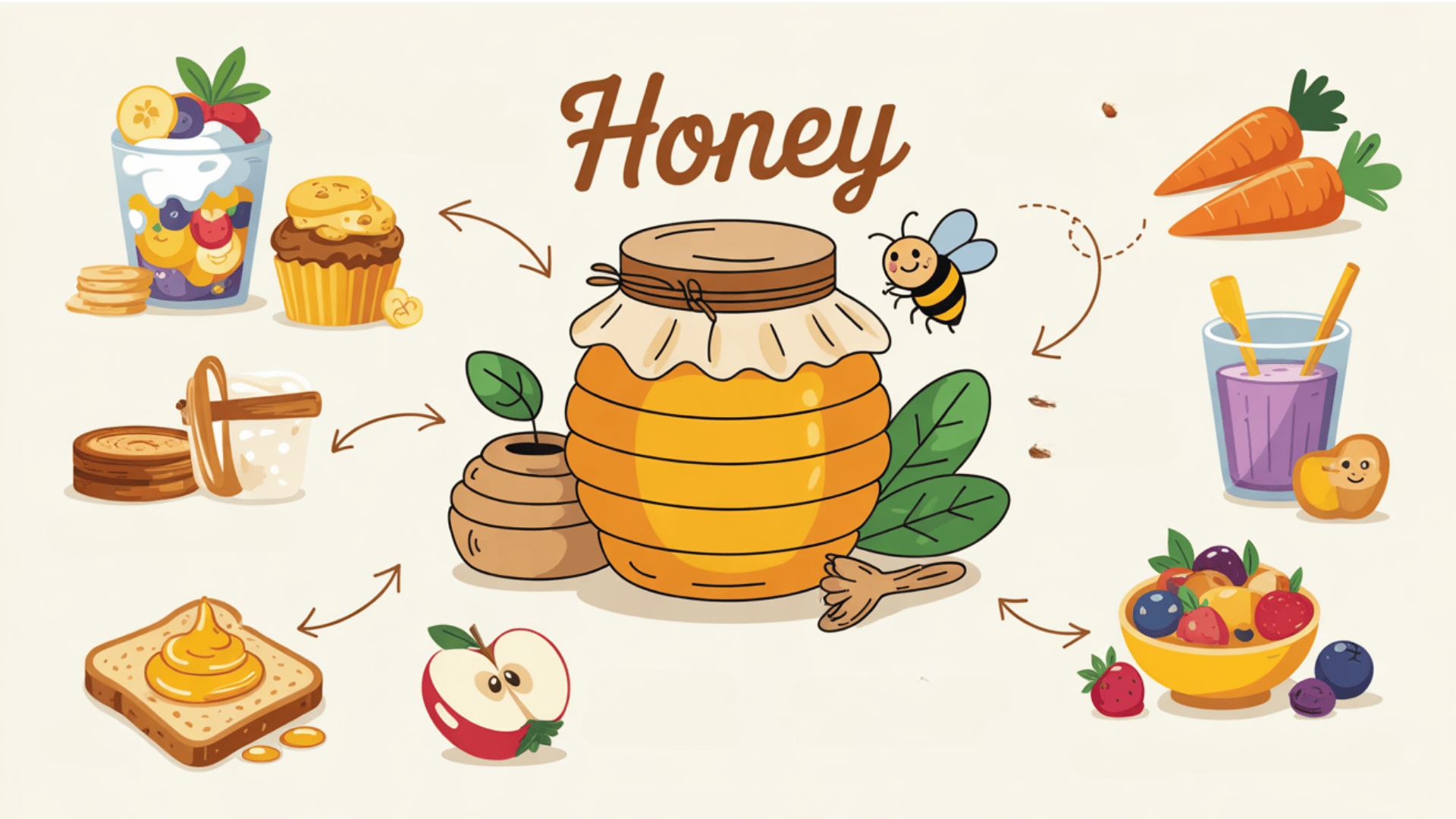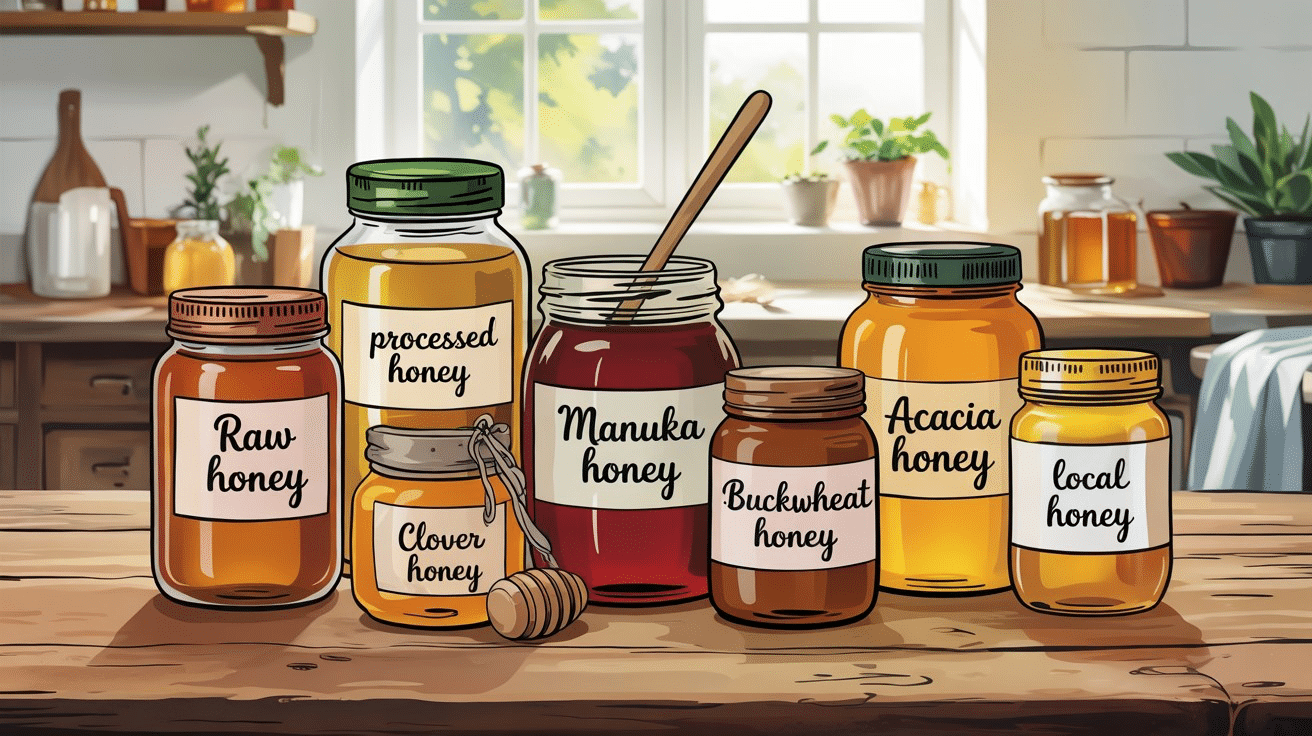
Honey stands as nature’s golden superfood, prized for centuries not just for its distinctive sweet taste but also for its impressive nutritional profile and immune-supporting properties.
Did you know that honey is the only food that never spoils? Archaeologists have found 3,000-year-old honey in ancient Egyptian tombs that remains perfectly edible!
While this natural wonder offers numerous benefits, it’s crucial to understand that honey must be completely avoided until your baby’s first birthday due to the risk of infant botulism.
After this milestone, honey becomes a safe, nutritious addition to your growing toddler’s diet.
Once your little one celebrates their first year, this natural sweetener provides immune-boosting compounds, soothing properties for common childhood ailments, and a healthier alternative to refined sugars.
We’ll learn honey’s toddler-friendly benefits, variety types, meal incorporation ideas, and essential safety considerations every parent should know.
Why Wait Until 12 Months for Honey?
Honey seems harmless, but it contains bacterial spores that produce botulinum toxin. While adults and older children have developed digestive systems that can fight these spores, babies under 12 months don’t.
When infants consume honey, these spores can germinate in their immature intestines, releasing toxins that cause infant botulism—a rare but serious condition that can lead to muscle weakness, poor feeding, constipation, and even breathing difficulties.
The CDC and pediatricians worldwide agree: no honey before the first birthday. This includes both raw and processed honey, as well as foods containing honey as an ingredient.
After your baby celebrates their first birthday, their digestive system is typically mature enough to handle these spores without risk, making honey a safe, sweet treat to introduce to their expanding palate.
Nutritional Benefits of Honey for Toddlers

When introduced at the right age, honey offers natural sweetness along with several nutritional benefits for toddlers. It contains antioxidants, enzymes, and minerals that can support immune health and digestion.
1. Natural Sweetness With Added Benefits
Honey offers more than just sweetness for toddlers over 12 months of age. Unlike refined sugars, honey contains trace nutrients that can complement a well-balanced diet while satisfying a child’s natural preference for sweet flavors.
2. Nutrient Profile
Honey contains small amounts of B vitamins, vitamin C, calcium, iron, zinc, potassium, and phosphorous. While not a significant source of these nutrients, honey also provides various antioxidants, including flavonoids and phenolic acids, that help fight oxidative stress in the body.
3. Energy for Growing Bodies
With approximately 64 calories per tablespoon, honey provides quick-release carbohydrates that fuel active toddlers.
Its natural sugars (primarily fructose and glucose) are easily digestible and offer sustained energy without the spike-and-crash effect of refined sugars, making it ideal for supporting energetic play and development.
4. Healthier Alternative to Processed Sweeteners
Compared to refined sugar, corn syrup, or artificial sweeteners, honey maintains its natural enzymes and beneficial compounds. It has a lower glycemic index than table sugar, causing less dramatic blood sugar fluctuations.
Unlike artificial sweeteners, honey contains no synthetic chemicals and provides small nutritional benefits alongside its sweetness.
How Honey Supports Your 1-Year-Old’s Health?

Honey offers several health benefits for children over 12 months old.
Its antimicrobial properties help fight harmful bacteria, while natural antioxidants support immune function by neutralizing free radicals and reducing inflammation.
For those pesky toddler coughs and sore throats, honey provides effective relief by coating irritated throat tissues and suppressing cough reflexes—studies show it works better than many over-the-counter medicines for nighttime cough symptoms.
Honey may also promote digestive health by functioning as a prebiotic, nourishing beneficial gut bacteria. When consumed with adequate fluids, this supports healthy digestion and may help prevent constipation.
The antioxidants in honey, particularly darker varieties, help protect cells from oxidative damage, potentially reducing the risk of chronic diseases later in life and supporting overall cellular health during this critical developmental period.
Safely Introducing Honey to Your Baby

After your baby’s first birthday, honey becomes a safe addition to their expanding palate. Properly introducing this natural sweetener ensures a positive experience while monitoring for any adverse reactions.
1. The First Taste Experience
Begin with a small amount—just ¼ teaspoon mixed into yogurt, oatmeal or spread thinly on whole-grain toast. Observe your baby for 15-20 minutes after their first taste. Introduce honey alone initially rather than combined with new foods to identify any reactions clearly.
Wait 3-4 days before increasing quantity to allow time for delayed reactions to appear.
2. Appropriate Portions for Toddlers
For children 12-24 months, limit honey to 1-2 teaspoons daily. The American Academy of Pediatrics recommends restricting added sugars for children under two, so honey should be an occasional treat rather than a daily staple. Consider honey a special flavor enhancer rather than a food group.
3. Monitoring for Adverse Reactions
While rare, honey allergies can occur. Watch for immediate signs, including hives, facial swelling, vomiting, diarrhea, wheezing, or difficulty breathing—which require immediate medical attention.
Milder reactions might include a rash around the mouth or digestive discomfort. Always introduce honey when you can monitor your child for several hours afterward.
4. Optimal Timing for Honey
Introduce honey in the morning or midday, allowing time to observe any reactions before bedtime. Avoid offering honey close to naps or bedtime, as the sugar content may affect sleep.
A small amount with breakfast or as part of a midday snack provides energy while giving you ample observation time.
Creative Ways to Include Honey Diet

Honey adds natural sweetness to your toddler’s meals through simple recipes, such as honey-sweetened yogurt parfaits layered with fruit and granola or banana oat mini muffins with honey replacing refined sugar.
Try honey-glazed roasted carrots or sweet potatoes for a nutritious side dish that appeals to developing taste buds.
For beverages, add a small drizzle of honey to warm milk with cinnamon for a comforting drink, or mix a quarter teaspoon into homemade smoothies with yogurt and fruit.
Honey pairs beautifully with whole grains like toast or crackers, enhances nut butters on apple slices, complements tart fruits like berries, and transforms plain yogurt.
These combinations offer balanced nutrition while introducing your toddler to varied flavor profiles and textures.
Different Types of Honey and Their Unique Benefits

Not all honey is the same—different types offer unique flavors and health benefits. The table below highlights popular honey varieties and how they may support your toddler’s well-being after 12 months of age.
| Type | Flavor/Look | Key Benefits | Toddler Use |
|---|---|---|---|
| Raw | Thick, cloudy | Rich in nutrients, enzymes, antioxidants | Best for natural health support |
| Processed | Clear, smooth | Longer shelf life, fewer nutrients | Safe, but less beneficial |
| Manuka | Earthy, dark | Strong antimicrobial and immune support | Use occasionally for immunity |
| Clover | Light, mild | Gentle taste, energy boost, antioxidants | Ideal first honey |
| Buckwheat | Dark, bold | High antioxidants, great for coughs | Good during colds |
| Acacia | Pale, mild | Slow sugar absorption, gentle on digestion | Great for steady energy |
| Local | Varies | May help with allergy tolerance, supports local bees | Good for seasonal allergies |
Parting Words
Honey offers your 1-year-old a treasure trove of benefits—from immune support and cough relief to digestive health and antioxidant protection.
Its natural sweetness provides a nutritious alternative to processed sugars while introducing your little one to complex flavor profiles that support developing palates.
Remember that moderation remains key when incorporating honey into your toddler’s diet. Limit servings to 1-2 teaspoons daily, using it as an occasional flavor enhancer rather than a dietary staple.
To ensure comprehensive nutrition, balance honey consumption with plenty of whole foods, vegetables, proteins, and healthy fats.
By thoughtfully introducing honey after your baby’s first birthday, monitoring for any adverse reactions, and exploring various honey types and recipes, you’re providing a natural superfood that supports your growing child’s health while satisfying their innate love of sweetness.
If you’re interested in more informational content on mothers and babies, feel free toclick here and explore other blogs that you might enjoy.
